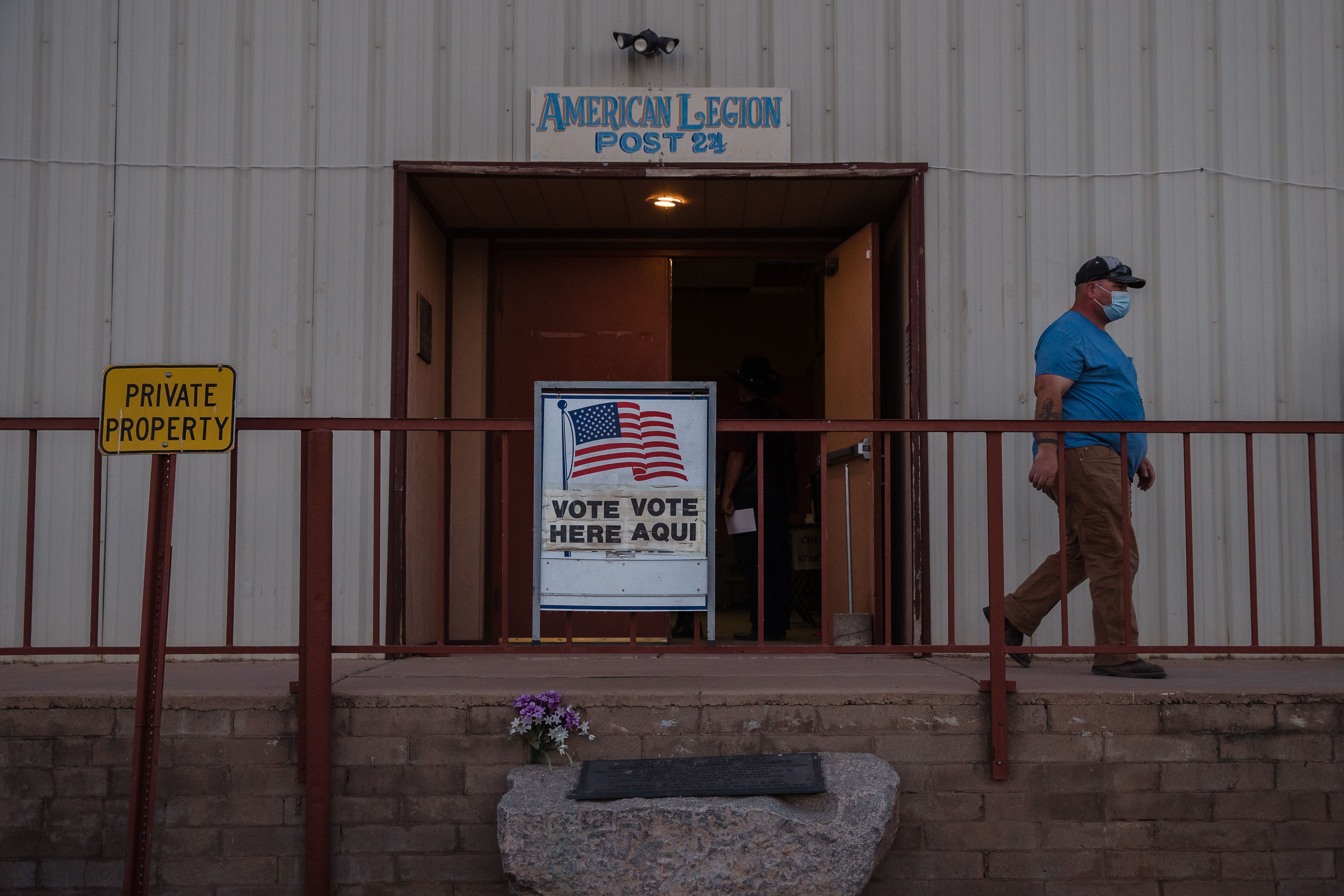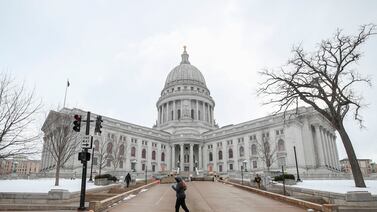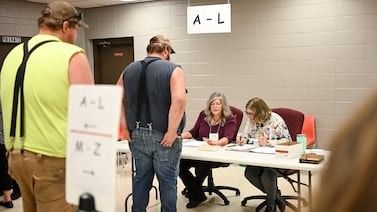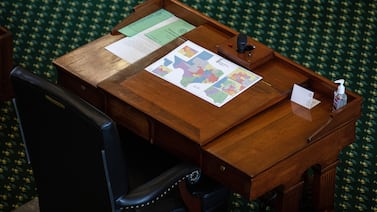Cochise County officials are considering hand-counting all ballots cast by the county’s 87,000 voters this election, a radical measure for a county of its size that election experts say is also problematic and unnecessary.
A hand count would produce inaccurate results, confuse voters, and consume extensive time, money, and labor, said C.Jay Coles, senior policy and advocacy associate at Verified Voting, a nonpartisan nonprofit that advocates for the responsible use of technology in elections. The county elections office estimated a hand count in Cochise would take 2,500 total hours of work. Election researchers and consultants generally advise against hand-counting ballots, because machine counts are proven to be more accurate and efficient.
“It’s such an opportunity for confusion, and, really, downright chaos,” Coles said.
The Republican-leaning county on the southern Arizona border is the latest to propose such an idea, part of a larger trend fueled by distrust of vote-counting machines that emerged after the 2020 election, when conspiracy theorists spread unfounded claims that the machines had been programmed to switch votes in favor of Joe Biden.
In neighboring Nevada, a state judge recently ruled that Nye County could move forward with a similar plan that had been challenged by a progressive advocacy group, ruling that the state law doesn’t prohibit hand-counting ballots. Efforts to force hand counts in New Hampshire slowed down election results last month for the primary. And after the election, in El Paso County, Colorado, losing candidates called for their races to be recounted by hand, which is not allowed under state law.
Less than one percent of registered voters in America live in jurisdictions where ballots are hand-counted, and many of them are small towns or precincts, according to research conducted by Verified Voting.
Cochise County officials will meet Tuesday, the day before early voting begins in Arizona, to consider whether to follow the county’s machine tabulation of paper ballots with a full hand count of those same ballots. The Cochise County officials who want to discuss the idea — two of three supervisors and the recorder — told Votebeat they know the hand count probably can’t happen for this election, considering the time, people, and money it would take. But they say they aren’t confident in the security of voting machines and still want to talk about their options.
“I could see adding a hand count to it all, to put everyone’s mind at ease,” Republican Supervisor Tom Crosby said.
Supervisors do not typically vote at work sessions, so likely the earliest that changes could be voted on is the next regular board meeting, on Oct. 25.
It’s unclear whether hand-counting ballots would violate state law, which says that ballots should be tabulated with certified election equipment, and “a hand count may only be used if tabulating with certified equipment becomes impracticable,” according to secretary of state’s office spokesperson C. Murphy Hebert. A hand count would also potentially violate the state’s requirement that results not be provided publicly until after the polls close on Election Day, Hebert said.
Other than potential legal issues, Hebert emphasized that “to allow hand counts of all ballots would be a wholesale change of state policy, require extensive logistical changes (staffing and space), extend the length of time required to tabulate results by weeks, produce inaccurate results, and potentially damage or misplace ballots, which could impact the ability to conduct recounts or review in legal challenges.”
“Every single time a person touches a ballot, it risks degrading or impacting the voter intent on that ballot,” she said.
Arizona already has many checks and balances in place to ensure that votes are tabulated accurately. State law requires counties to test their machines prior to each election to make sure they are counting votes correctly, for example, and counties are required to conduct a post-election hand count of a portion of ballots if the political parties request it and supply enough workers. If that hand audit finds discrepancies, it can be extended to recount more ballots.
“A hand-count audit on top of a full hand count would be pointless,” Hebert said.
Cochise County Supervisor Chairwoman Ann English, a Democrat, said she’s confident in the effectiveness of this hand-count audit and doesn’t think a full hand count is necessary.
“I just think that is overboard,” English said.
The full hand count of Maricopa County’s 2020 ballots launched by the state Senate and paid for mostly by Trump allies took months and hundreds of workers to compete and cost millions. It was a disorganized and dysfunctional affair, yet the final results were only slightly different from the official election results, confirming that the machines counted votes accurately.
“Anything Else Is Less Secure”
Crosby, Supervisor Peggy Judd, and County Recorder David Stevens say they are not pushing the hand-counting decision but are simply entertaining an idea from voters who are concerned about the vote-counting machines.
But these county officials — all Republicans — have not responded to these concerns by assuring the voters that their systems are secure or by debunking false narratives, as Maricopa County Republicans and Republican officials in other states have done.
Stevens told Votebeat that when he is asked about the security of his county’s elections, he tells voters that the most secure election is one with only Election Day in-person, precinct-based voting, with ballots counted by hand. “Anything else is less secure,” he said.
He said he told concerned voters that they should advocate for a meeting on the topic.
“I said let’s get a work session, contact the supervisors,” he said.
Asked if he trusts the county’s election process, Stevens said, “I do for the part I’m involved in.”
Stevens, like most of Arizona’s elected recorders, handles voter registration, mail-in voting, and in-person early voting. The Elections Department separately handles Election Day voting and ballot counting. But Stevens also said he can’t control every aspect of mail-in voting, and he has concerns with the U.S. Postal Service’s handling of ballots, after he said he has dealt with a few local post offices making mistakes when processing ballots for delivery.
Crosby and Judd said residents came to them asking for a work session after meeting with Stevens.
At the supervisors’ Sept. 27 board meeting, a handful of residents advocated for the hand count. “This is purely a back-up or check on a system which should be in place anyway,” Sierra Vista resident Joseph Patterson said. “So what we are hoping for is to regain trust, restore faith in our government, in one another. Be able to trust the results that we see.”
Judd also has encouraged residents to speak out on the topic.
In a Sept. 23 email that Judd said she sent to residents who had expressed interest in the topic, she asked residents to look through Arizona election law for anything that might support the idea of the county hand-counting ballots. She encouraged them to continue their advocacy and also suggested people remove themselves from the early voter list “as a way to demonstrate our collective desire to have in person elections on election day.” Votebeat found the letter on a local mayoral candidate’s Facebook page.
“I believe a large number of voters in our county taking this action with the Recorders office will give wings to our movement overall,” Judd wrote.
Reached by phone, Judd told Votebeat that she was simply supporting the group’s excitement, but she didn’t necessarily agree with their ideas. “I wanted them to know that I was hearing them,” she said.
Crosby submitted the request to place the idea on the work session agenda. He said his email inbox has been flooded with requests to eliminate the use of voting machines. He said everyone at a Cochise County Republican Committee meeting he went to last week “hates the machines.”
Crosby said he was spammed with perhaps thousands of the same email on the topic. He shared a few examples, all coming from an email address connected to an advocacy group called Act for America. The email appears to have been sent to county officials across the state.
“We are calling on all Arizona County Officials across the state to ban the use of all electronic voting machines, including ballot tabulators, in this upcoming election,” the email says. “All machines are a national cyber security risk that is unsecure, hackable, and inaccurate!”
Candidates in the statewide election have also perpetuated false claims about the insecurity of voting machines. Gubernatorial candidate Kari Lake and secretary of state candidate Mark Finchem, both Republican, filed a lawsuit attempting to block the use of vote-counting machines in the November election, claiming there were problems with the machines. A federal judge dismissed the suit for lack of standing in August.
There is no evidence that voting machines were hacked in 2020, all court cases alleging so have been dismissed, and federal agencies and experts have said that 2020 was the most secure election to date.
Hand-Counting a Flawed Proposition
Hand-counting advocates who, of late, mention Brazil or France as models of places that use the method without problems don’t consider the many differences between elections in those countries and the United States. For example, those elections sometimes have only one contest on the ballot. In Cochise County, Elections Director Lisa Marra said there are an average of 50 contests on the ballot, depending on the precinct.
The length of the ballot makes hand-counting a lengthy and tricky proposition.
Coles said those who don’t trust machines can take comfort in the hand-count audit. His group advocates for risk-limiting hand-count audits, which use a formula to determine the number of ballots to recount. He said machines have been proven to be far more accurate than humans, who are known to be error-prone because they tire quickly during the repetitive task of counting votes.
“As human beings, our minds can wander,” he said.
The other problem, he said, is Arizona has no laws or legal guidance specifying which count would be official if the hand count doesn’t match the machine count. This could prompt disputes for officials who are required to certify a final vote and create even more voter confusion if inconsistent results are announced, he said.
With the interest in hand counting in Nevada, the secretary of state’s office created regulations that dictate how to conduct hand counting, such as a requirement for bipartisan teams. Still, there are questions about whether the rules are enforceable. Arizona law does not provide any guidance on when or how a hand count could happen, Hebert, of the secretary of state’s office, said.
Marra, who oversees ballot tabulating and Election Day procedures for the county, said she doesn’t know much about the exact proposal, but she has concerns about hand-counting all ballots, including “time to count 50 races on 50,000 ballots, people, location, security of ballots, cost, etc. All the things other states have encountered and Maricopa for their audit.” Those factors led Marra to estimate the hand count would take 2,500 hours total.
Marra said she’s focused on trying to conduct a safe, secure, and accurate election and “won’t be distracted by outside influences.” She said Judd asked her to go to the work session Tuesday, but declined to say whether she will attend.
English, the Democrat on the board, said the other supervisors appear to be entertaining the idea for political reasons.
“I’m not sure who they are trying to satisfy,” she said. “I’m satisfied with the way we do it. The election process is good. We follow it to the letter and we have a very strong election.”
Jen Fifield is a reporter for Votebeat based in Arizona. Contact Jen at jfifield@votebeat.org.






